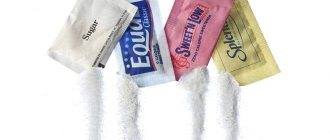Protein-carbohydrate mixtures, simply called gainers (Gain - from English “gain”) have long conquered a significant part of the sports nutrition market and their adherents. The main task of this type of sports supplement is to increase muscle mass, restore tissue and replenish strength. But that’s not all: a gainer can be used not to replenish, but to add strength before training, and also to reduce the effect of the catabolic hormone cortisol.
The vast majority of gainers are based on simple (fast) carbohydrates, although there are also those that are based on complex (slow) carbohydrates. In addition, leading manufacturers are trying to make their products original and attractive, so they often add creatine, amino acids, vitamins, minerals and other additives to them. Elite product lines also have special enzymes that help quickly absorb the entire volume of the product.
Among such mixtures, there are high-carbohydrate (85% carbohydrates, 10-12% proteins and 0.5-1% fats) and high-protein gainers (70/25-27/0.5-1, respectively). This does not take into account other components such as creatine, taste enhancers, smell enhancers and antifoam.
Taking gainers implies a large single dosage, which the manufacturers immediately took care of: measuring spoons are an order of magnitude larger than those of proteins, for example.
Effect on the body
It would be advisable to consider the influence of a gainer, its benefits and harm to the body from the point of view of analyzing the components of the carbohydrate-protein mixture without any other additives: proteins, carbohydrates and fats.
Proteins , when digested, break down into simpler compounds - amino acids, which are absorbed and distributed to the appropriate places according to their functions. Thus, the well-known isoleucine, valine and leucine (BCAA) are excellent building materials for muscle tissue, a restorer of damaged fibers and suppressors of catabolic processes. Even one serving of a high-carbohydrate product will provide enough of most important amino acids.
Carbohydrates are broken down into glucose and fructose, which form new ATP molecules. Adenosine triphosphate (ATP) is the body's source of energy. Naturally, another portion of the energy is generated during the breakdown of complex compounds into simpler ones. Simply put, carbohydrates give you energy and strength to exercise even after a hard day. Depending on the time of administration (before or after training), the gainer either adds strength (reduces fatigue during training) or replenishes wasted resources in a short period of time. It is worth noting the restorative properties of carbohydrates: pain the next day is much less pronounced when using a gainer.
Fats . The total amount of animal fats in supplements of this type is very small, but they still contribute to the nutrition of the body with useful substances such as saturated fatty acids.
To summarize, carbohydrate-protein mixtures are a fairly effective way to gain weight and restore, which is confirmed by both scientific research and amateur and professional athletes.
How to use gainer correctly?
Dosage
This drug can be used in different ways. Of course, there are almost always indications for use on the package, or if you work with a trainer, you can ask him for advice.
This option is good, because the coach is a person who has been dealing with this issue for quite a long time and probably knows how best to choose an individual program for you. But it has pitfalls. For example, the fact that some companies enter into an agreement with trainers and it is more profitable for them to sell you a certain, probably more expensive, drug and sell it more, so they may prescribe you a larger dose than you actually need. What to do then?
There is one proven, but troublesome option - to create your own program. The option is reliable and will allow you to get the maximum benefit, but requires a small investment of time. We will tell you about it, and whether to use it or not is entirely up to you.
If you pay a lot of attention to training and gaining muscle mass, you should know the amount of calories you need to consume during the day. If you don’t know your norm, find information about it on the Internet or talk to your trainer, this is important. This option is that you need to count the amount of calories consumed from food and use a gainer to increase it. If the amount of calories remaining for the drug is too large, its intake can be divided into several times a day.
This method is the most effective, since people have different builds and different goals, and therefore they need different programs. Training requires responsibility and special seriousness in relation to what and how you consume.
There is, of course, a second, simpler option. This option is suitable for people whose diet is more or less stable and established. You need to first use a standard portion of the drug for a week and observe how your weight changes or does not change and, based on the results, calculate the dose that is most suitable for you.
The fact is that by strictly following the instructions, you will pass through a lot of extra calories, which, of course, will not be stored in fat (most likely) but will not bring any benefit. You don't want to waste your money, do you? In addition, the drugs contain a fairly large amount of sugar, which is difficult for the body to tolerate and can give you unpleasant digestive problems and discomfort.
Admission rules
The drug is sold in the form of a dry powder or mixture. And it can be dissolved in almost any liquid. Water, milk, kefir - whatever. Some people also stir it in juice, but here you need to be careful with the sugar level; you hardly want to drink syrup, do you? There are no strict restrictions on the amount of liquid; be guided by your own taste and stomach volume. But it is important that the liquid is cold or slightly warm, otherwise the protein will curdle from the high temperature and will not bring you any benefit.
In terms of time, remember one thing - you don’t need to drink immediately after training. At the very least, this is just self-abuse; processing the drug is also work for him, and he still needs to move away from training. A good time to take is between breakfast and lunch or 1.5 - 2 hours before training. Do not take the drug less than an hour before training, otherwise you will only make it worse for yourself - the body, being loaded with the digestion of the gainer, will also be subject to the severity of the workout and the beneficial substances from the drug will simply not be absorbed.
So, to summarize, gainers will greatly help you achieve your goal. Be smart in your actions and you will be able to enjoy the result at its best. Wishing you hot workouts and a toned body!
Gainer benefits
In addition to increasing the energy component of the body (more energy - you can exercise more) and recovery (the faster the muscles heal, the faster they grow), mass gainers are also useful because of:
- high calorie content per serving (500-1300 kcal);
- the presence of several necessary components;
- increase in strength endurance.
And all this without additional ingredients: creatine, vitamins and minerals, which also contribute to weight gain and strength.
The advantages of this supplement include its cost: one and a half times cheaper than high-quality protein, as a rule.
Regarding calorie content, an important aspect for gaining weight is an excess of calories so that the muscles do not need anything. A gainer is ideal for this. Although Denis Borisov’s opinion that such mixtures are useless has gained wide popularity: the same fast and slow carbohydrates can be obtained from food, and protein from protein or pure amino acids.
By the way, one “skup” (measuring spoon), mixed with milk, juice or plain water, allows you to replace one of the meals if it is not possible to eat fully at the moment.
One of the basic principles of male bodybuilding is excess calorie intake. Simply put, men need to literally flood their muscles with nutrients. A protein-carbohydrate cocktail provides this opportunity. In addition, this is a simple way to close the so-called protein-carbohydrate window.
Is weight gainer harmful for women?
Even if “Beauty is above all,” we should not forget that the side effects described above do not have gender differentiation and similarly lead to disruption of the functioning of internal organs, including decreased libido and impaired reproductive functions. Women should choose gainers carefully and first consult with their doctor.
Gainers can cause increased appetite in women
Using gainers without control, women face the following problems:
- increased appetite;
- stomach upset;
- increase in body fat;
- increased swelling.
Gainer harm
A very large single dose of carbonates (carbohydrates) can cause pancreas spasm even in a healthy person who is not accustomed to such an abundance of organic compounds of the same type. But, as practice shows, these are isolated cases out of thousands. In addition, some athletes, with long-term use of such cocktails, note pathological changes in their liver. There is no scientific evidence for such phenomena: it is unknown what else these guys used. It is possible that excessive amounts of protein in their diet over a long period of time led to liver problems.
By the way, this supplement will not cause any serious disruption of organ function or harm, since all components are of natural origin. The only thing that can cause stomach upset and poisoning is the expiration date of the product and inappropriate storage (open packaging in a humid place).
For men
The main harm that this type of mixture can cause for men is problems with excess weight and appearance. And this similar phenomenon is relevant partially for the mesomorphic body type and completely for the endomorphic one. The total body weight can increase (due to adipose tissue), and to the average user it will seem that it is the muscles that are growing. Therefore, the main danger for unskilled athletes will be the thoughtless and excessive use of such mixtures.
Example: due to excessive body fat (more than 20% of the total body weight) in men, a sex hormone such as testosterone begins to aromatize into female estrogens. This results in a drop in libido and a decrease in the growth of muscle tissue.
For ectomorphs with their accelerated metabolism and lack of lipid formation in the body, gainers do not cause any harm. With the right approach, there is only benefit.
For women
The female body of any body type tends to increase the volume of subcutaneous fat with sufficient or even excess nutrition, especially if the girl’s diet is rich in carbohydrates. This is true to a greater extent for the same endomorph and mesomorph and to a slightly lesser extent for the ectomorph: this is how female physiology works. Therefore, the main danger for women is the same excess weight caused by the lack of dosage of carbohydrate-protein cocktails.
For teenagers
For a developing organism, a gainer is harmful only if the teenager is allergic to specific components of the product - lactose intolerance, for example. A child's body is more susceptible to allergic reactions than an adult.
Again, a teenager’s hormonal system undergoes changes, and with excessive consumption of fast carbohydrates, there is a possibility of obesity and, as a consequence, the development of a boy’s body according to the female type (pear shape). Otherwise, a gainer in moderate quantities, especially on training days, will only bring benefits in the development of a teenager’s body: it will have an effect on the muscular system, the skeletal system, and the ligamentous system. In addition, half of the fast carbohydrates in a gainer are sugars, and sugar is glucose, which is so necessary for the normal functioning of the nervous system and brain of a teenager, especially during school. The benefit in this case is obvious.
Is it harmful in large doses?
The unequivocal answer is harmful. Primarily due to an excess of carbohydrates of varying complexity. And, if slow carbohydrates (complex) in certain quantities are beneficial, then fast (simple) ones can cause obesity.
The mechanism for gaining excess weight is as follows: excess simple carbohydrates are converted by the body into subcutaneous fat and deposited in areas with large concentrations of alpha receptors. For men it is the stomach, sides and lower back, and for women it is also the hips and buttocks. Excess weight in places where alpha receptors accumulate is burned very slowly, while in other parts of the body (arms, upper back, chest) it can be lost much faster (beta receptors predominate there).
Is it harmful at night?
There is no danger to health, but from another point of view, taking carbohydrates at night is still undesirable, and here’s why:
- may have bad dreams;
- waking up at night due to the work of the digestive system;
- absence or short duration of the deep sleep phase.
All of the above is connected into a single chain of events. Carbonates can cause bad dreams: this has been confirmed by scientists. Because of this and because of the work of the gastrointestinal tract, a person often wakes up at night, especially when turning over. As a result, deep sleep is reduced, and because of this, the body's recovery reactions do not work at full strength. The result is a bad mood in the morning, unrecovered muscle damage, lethargy.
How to use
How to take gainer correctly? To achieve the greatest effectiveness, take the gainer in accordance with the following recommendations:
- Calculate your calorie deficit.
- Calculate how many servings of gainer this will be.
- Don't count the proteins included.
- Divide the calorie deficit in your main diet by the number of gainer servings you can take per day.
- Be sure to take a portion of the gainer 15-20 minutes after training.
This is enough to achieve the optimal result without resorting to any tricks.
Side effects
The main side effect of this type of supplement is the suppression of fat burning. Carbohydrates obtained from gainers are much easier to break down by the body than subcutaneous fat, and there are a lot of them. To break down complex substances into simple ones, energy is also needed: carbohydrates are the leaders, then fats come, and proteins are the worst to break down. So why should the body strain and spend more than necessary? He always follows the path of least resistance.
Therefore, this supplement is not suitable for weight loss and muscle definition (“cutting”). But this is true for taking a cocktail before the start of classes. What if you drink after it?
Using a gainer after finishing a workout aimed at body shaping (fat burning) can erase all the results gained during this session. After all, the main principle of fitness and bodybuilding when losing weight is to receive fewer calories than were burned. For example, 1500 kcal were spent, but only 1200 were replenished with food. The body will take the difference from its own reserves - the fat layer. It is very difficult to calculate calories burned during training, and the carbohydrate-protein mixture is quite high in calories.
How to avoid them
Gainers taken before or after training in clearly defined doses will be used strictly to replenish lost energy and restore (gain) muscle mass. Therefore, when losing weight, gainer should be taken two to three times less than the dose recommended by the manufacturers. On average it is 60-65 grams. This means that when burning fat you can only use 20-30 g, and even then, there is a high risk of overdoing the dose.
On rest days (inter-training days), it is advisable to take protein and carbohydrate cocktails in the morning, since the absorption of all nutrients in the morning is increased, and the nutrients themselves go to provide the body with everything it needs after an overnight fast. This is useful in terms of muscle growth and is safe when cutting.
What may be included in gainers?
In addition to macronutrients, gainers may also include the following components:
Creatine monohydrate
This amino acid helps 1. Dietary Supplements for Exercise and Athletic Performance / The Office of Dietary Supplements (ODS) of the National Institutes of Health (NIH). 2. RVT Santos, RA Bassit, EC Caperuto, LFBP Costa Rosa. The effect of creatine supplementation upon inflammatory and muscle soreness markers after a 30km race / Life sciences withstand a greater volume of training, has a positive effect on power, strength and recovery rate.
Creatine can also be provided by PJ Cribb, AD Williams, A. Hayes. A creatine‑protein‑carbohydrate supplement enhances responses to resistance training / Medicine and science in sports and exercise increases muscle mass without excess fat, even if consumed together with carbohydrates.
If a mass gainer contains around 3-5g of creatine, it will likely help boost your workout performance and improve your body composition. True, for the effect you will have to take the sports supplement constantly.
B vitamins
Almost any gainer includes riboflavin and vitamin B6, which are necessary for energy production, as well as folate and vitamin B12, which are involved in the synthesis of new cells and the restoration of damaged ones.
Lack of riboflavin and B6 can K. Woolf, MM Manore. B‑vitamins and exercise: does exercise alter requirements? / International journal of sport nutrition and exercise metabolism reduce performance during training, so an additional source of these vitamins will be useful for those who exercise a lot and eat little.
However, if your diet is in order, taking additional vitamins will not provide Vitamin B‑12 / Mayo Clinic any benefits.
Antioxidants
Most weight gainers include vitamins C and E, antioxidants that help fight oxidative stress.
Research from Dietary Supplements for Exercise and Athletic Performance/The Office of Dietary Supplements (ODS) of the National Institutes of Health (NIH) does not support the benefits of such supplements for muscle building and performance gains. Quite the contrary: additional doses of antioxidants can weaken the activity of the body's signaling pathways, reducing the stimulus for muscle growth.
True, gainers contain much less vitamins C and E than are needed for any effect.
Vitamin D
If there is a lack of vitamin D, additional intake as part of a supplement can be taken by S. Pilz, S. Frisch, H. Koertke. Effect of vitamin D supplementation on testosterone levels in men / Hormone and metabolic research has a positive effect on the level of testosterone, an anabolic hormone. True, the dose of this vitamin per serving of a gainer is many times less than what is needed to fill the deficiency.
If everything is normal and there is no lack of vitamin, the additional intake will not have any effect SD Scholten, IN Sergeev, Q. Song. Effects of vitamin D and quercetin, alone and in combination, on cardiorespiratory fitness and muscle function in physically active male adults / Open access journal of sports medicine on performance.
Microelements
Gainers often include a full set of macro- and microelements: calcium, iron, potassium, phosphorus, iodine, magnesium, zinc and others.
A deficiency in any of the essential elements can negatively impact productivity and well-being. But if you get enough of them from your diet, taking additional supplements will not affect your body composition or athletic performance.
Probiotics and fiber
Some gainers add fiber and a complex of probiotics - a set of lactobacilli that have a good effect ML Ritchie, TN Romanuk. A meta‑analysis of probiotic efficacy for gastrointestinal diseases / PloS one on intestinal microflora.
However, these microorganisms do not live very long, and it is impossible to say for sure how many of them remain in the product. Overall, it is doubtful that lactobacilli in mass gainers provide any benefit to the intestines.
Myths about using mass gainer
Over the years of its existence, this type of sports nutrition has acquired several firmly rooted myths, namely:
- has a negative effect on potency;
- should not be taken by people with pancreatic disorders;
- endomorphs should not take gainer at all;
- promotes the development of heart disease;
- thin guys and girls need to take it 3-4 times a day.
All of this is fiction, especially regarding the development of illnesses and diseases. Any regular or sports doctor will confirm this: people eat carbohydrates along with proteins every day (as a regular meal), and everything is fine.
In case of disorders of the pancreas, you only need to reduce the recommended dose by one and a half times, and for obese people by 2-2.5 times, but you can take it.
Thin people do not need to drink gainer so often: although metabolism is accelerated, the body only takes in a limited amount of nutrients at a time: the excess is either excreted or deposited under the skin. This myth was invented by the manufacturers themselves to increase product consumption and increase sales: a kilogram of sports drink with a recommended dose of 65 grams is only 15 servings. Therefore, if you eat three servings a day, then a kilogram will last less than a week.
Is weight gainer harmful to the kidneys and liver?
Manufacturers and sellers of dietary supplements prove in every possible way that gainer is useful and dangerous only in case of overdose or use of counterfeit. But is it? How is gainer harmful to the kidneys and liver? The answer is simple and lies on the surface. Athletes who take supplements tend to expose themselves to increased stress. Taking supplements in large quantities over a long period of time can lead to illness.
First of all, oddly enough, the kidneys and liver suffer due to the high protein content in dietary supplements. So, athletes put a lot of stress on the kidneys by using gainer. The genitourinary system does not always cope with the super task of removing protein. As a result, existing diseases worsen or new ones appear. Therefore, the use of gainer for athletes suffering from pyelonephritis is contraindicated.
If kidney function is impaired, the liver takes over the function of filtering toxins. It is a kind of adsorbent for the body. Therefore, loading it with an increased amount of sugar, protein and carbohydrates can lead to a number of pathologies:
- the occurrence of cholelithiasis;
- development of atherosclerosis;
- diabetes;
Taking weight gainers can lead to diabetes
- diseases of the gastrointestinal tract;
- dysfunction of the thyroid gland;
- formation of fatty hepatosis;
- decreased libido.
This is not a complete list of diseases that an athlete can acquire by using gainer without control.
Who should not drink gainer?
The benefits and harms of Gainer sports nutrition lie in its calorie content and composition. As mentioned above, all somatotypes (body types) can take such supplements, but in different doses. In case of violations of some functions of internal organs, it is also impossible to talk about completely abandoning this supplement, only about taking it in doses.
If someone suffers from lactose intolerance, then there are already similar products on the market without it. For example, the product line of Boris Tsatsouline, who, by the way, is lactose intolerant.
In general, endomorphs can safely take carbohydrate-protein mixtures, the basis of which will be not simple, but complex carbohydrates.
Is it harmful to take gainer?
Content
This question cannot be answered unambiguously, since the harm and benefit of a gainer can be equivalent. If you take the powder under the supervision of a doctor or trainer, you are likely to experience good results. The downside is contraindications and side effects, which can lead to the emergence of new diseases and exacerbation of chronic ones.
Gainer – food supplement
Also, the disadvantages that make gainers dangerous include their high sugar content. This has a detrimental effect on blood sugar levels, tooth enamel and skin condition.
Choosing a useful and correct gainer
Such a choice depends on goals and material resources. Cheap supplements do not contain anything other than BJU, and the main ingredient of low-priced products is maltodextrin. Those who already have creatine, protein or amino acids, vitamin and mineral complexes can also choose a similar sports nutrition.
If we are talking about buying one product, but combining many ingredients, then finding such a gainer will not be difficult. An example is BioTech's Hyper Mass 5000. Per 100 grams of product there are:
- 65 g carbohydrates;
- 26 g proteins;
- 2 g fat;
- 7.2 g of creatine in various forms (monohydrate, pyruvate, citrate);
- wide amino acid profile (BCAA - 4.75 g, histidine, lysine, methionine, glutamine, tryptophan, glycine, alanine, aspartic acid and others).
Even more expensive, but with an expanded composition, Serious Mass from Optimum Nutrition, which in addition to the above also contains a large number of various vitamins and minerals.
Previous
Sports nutritionHigh protein gainer
Next
Sports nutritionProtein and alcohol: compatible or not?
What are gainers
A mass gainer is a sports nutrition product for weight gain.
Like protein, it comes in powder form and is mixed in water or milk. Only it contains significantly more calories, and in addition to protein, it contains fats and quite a lot of carbohydrates. The Lifehacker Telegram channel contains only the best texts about technology, relationships, sports, cinema and much more. Subscribe!
Our Pinterest contains only the best texts about relationships, sports, cinema, health and much more. Subscribe!
There is no one mass gainer formula, so the calorie content and macronutrient percentage of different products can vary greatly. As a rule, 100 g of gainer contains 350–450 kcal, 45–60 g of protein, 50–80 g of carbohydrates and 1–18 g of fat. The serving size is indicated on the packaging - from 50 to 360 g, but no one is stopping you from eating more or less.
Rules for taking the product
Gainers often replace a full meal in a sports diet, because not everyone can eat five to six times a day, due to physiological characteristics or lack of time, but drinking a cocktail is no problem.
The appointment can be made one and a half hours before the start of the training. In this case, the athlete will be prepared, ready for a large number of approaches and duration of the lesson. However, this approach does not help burn fat; on the contrary, it increases the chance of building it up.
From this comes the following method. Athletes often use mass gainers after training. By that time, the energy has been spent, and sports nutrition helps the body quickly restore its strength.
About the gainer: general information
To put it very simply, a gainer is a mixture of proteins and carbohydrates. Good products from this group usually contain several types of both. Protein serves as a building material for muscles, and carbohydrates provide a large amount of energy in order to pump up stubborn metabolism and cause weight gain in people who are not genetically predisposed to this. The English name “gainer” can be roughly translated as “increaser”.
Unlike sports proteins, which have a positive effect primarily on the growth of muscle mass, a gainer increases total body weight. Well, if this is so, then in addition to muscle growth, the fat layer will also increase somewhat, this is important to understand. Having gained good muscle mass and increased strength, you will need to devote some time to “relief” training in order to get rid of a certain amount of fat, which will inevitably increase during the mass-gaining period.
What is the composition of the gainer?
- Proteins and amino acids . The most commonly used protein is whey protein (and this makes sense, since it is the most effective); egg, soy and, less often, other types are also used. To enhance the protein component, manufacturers often add some amino acids to their products, such as BCAAs and glutamine.
- Carbohydrates . Gainers include a carbohydrate complex, which from good manufacturers includes several types of carbohydrates with different rates of absorption. Cheap gainers often add a lot of sugar: these are not the best products, it is better to refrain from using them, giving preference to higher quality types.
- Fats . Gainers also contain a small amount of fat.
- Vitamins and minerals . Often (but, alas, not always) vitamins and minerals are included in the composition of the gainer, the list and quantity of which varies greatly in different products.
- Other trace elements . Gainers contain other useful substances: Omega-3 polyunsaturated fatty acids, enzymes for better absorption, creatine monohydrate, etc. The list and presence or absence of one or another component varies greatly among different manufacturers.
Read more:
- Top 10 sports supplements: what to take for muscle growth
- Types of protein: similarities, differences and application features
How does a gainer work?
A gainer, as we already know, has two main components: proteins and carbohydrates. Each of these “halves” has its own function: protein is a building material, “building blocks” for muscles, everything is clear here. Well, why carbohydrates? The thing is that muscle growth requires not only material, but also energy to provide fuel for the numerous biochemical processes occurring in the body during the period when muscles recover after training and grow.
At the end of the training session, the body does not immediately rush to build muscle tissue. First, you need to compensate for the loss of energy, which can also be obtained from protein, but it is irrational and labor-intensive for the body. In other words, using protein for energy is like “heating a stove with paper notes.” It is carbohydrates that supply the body with the necessary energy, and in most gainers they make up the main part of the product composition.
Who should take a gainer?
- Pronounced ectomorphs or those in whom this same ectomorphic body type, although not present in its pure form, is predominant. They are also called “heavy growers” or “hard gainers”; the term is not entirely successful, but widespread in the literature.
- Athletes of the mesomorphic type, strong and muscular by nature, who need to quickly gain weight for one reason or another (when changing the weight category to a heavier one, for example).
- Trainers in those disciplines where extremely high energy consumption is an integral part of the training process. For example, in kettlebell lifting or crossfit. The carbohydrate component of the gainer will be very useful for such athletes.
Who shouldn't take a gainer?
- Endomorphs who are naturally inclined to be overweight. Gainer in such athletes will cause rapid growth of adipose tissue, which, due to genetics, will not be easy for them to get rid of.
- Trainers with a predominance of the mesomorphic type, who exercise as usual, without the desire for an ultra-fast jump in weight gain. Such athletes, as a rule, make good progress without consuming a gainer. It is better for them to use protein from sports nutrition.
What are the benefits of taking a gainer?
- Gainer helps move progress from a “dead point” for those trainees whose genetics are not very suitable for strength sports.
- Sports protein-carbohydrate mixtures make the diet more balanced and help avoid overload of the gastrointestinal tract: intense training requires a lot of energy, which can be difficult to obtain from ordinary foods.
- Vigorous physical activity over a long period of time without adequate nutritional support can be detrimental to health and push the athlete into a state of overtraining. A hard workout is still stressful for the body. And timely protein-carbohydrate supplementation in the form of a gainer will help you overcome stress and quickly recover without harm to your health.
- Progress in training that a gainer can provide brings moral satisfaction and improves a person’s psycho-emotional state.
Are there any disadvantages to gainers?
If we talk about the disadvantages of gainers, they are inherent primarily in cheap varieties of this type of sports nutrition, which often contain too much sugar - such products provoke the growth of fat deposits. Gainers from serious manufacturers have a balanced composition; the carbohydrate component in them is represented by several types of carbohydrates with different periods of absorption. Initially, for a healthy person, competent intake of a high-quality gainer, in compliance with the recommended dosages, will not cause harm.
Gainers may be contraindicated in the following cases:
- Individual intolerance to individual components, which can lead to allergic reactions and problems in the gastrointestinal tract.
- Gainers should be used with extreme caution by people suffering from various forms of diabetes. The reason is clear - it may contain sugar. You need to carefully study the composition of the gainer before purchasing.
- Some specific diseases, such as enzyme deficiency, can also become contraindications when taking a gainer.
- Women during pregnancy and breastfeeding should refrain from taking any types of sports nutrition and gainers, including. The same applies to children and adolescents under 18 years of age.
Gainer and protein: friends or rivals?
Proteins and gainers are the two most common types of sports nutrition, which differ in composition (including the percentage of proteins and carbohydrates) and in the effect they have on the trainee’s body.
- Protein primarily contributes to the gain of muscle mass - the total body weight also increases slightly, and not only due to muscle mass. Protein also has a moderate fat-burning effect (this is characteristic of protein).
- Gainer increases total body weight; the emphasis on muscle growth is not as strong as when taking proteins. But to make it more noticeable, you definitely need to train: competently, intensively and without overdoing it with the frequency of training.
Despite the noticeable difference in composition and effect produced, it would be fundamentally wrong to oppose these two types of sports nutrition: they may well coexist, mutually complementing each other within the diet of one athlete. Their quantitative ratio, as well as the type of gainer chosen, depends on a number of factors: the genetics of the athlete, his goals and the nature of his training.
Pros and cons of gainer
Undoubtedly, if we talk about taking any supplements, you should always keep your head on and not overdo it with dosages. The carbohydrate mixture itself is made exclusively from natural ingredients. Which makes it almost completely safe for the average person. On the contrary, gainer is more useful, due to which it has gained mass popularity and prevalence in every country.
pros
- Inexpensive price compared to other types of additional additives;
- Saving time and effort when replenishing energy;
- An excellent tool for recovery after physical activity;
- High calorie content of the product;
- Increased strength and endurance;
Minuses
- The main side effect of giving up regular food in favor of cocktails will be disruption of the gastrointestinal tract;
- Intolerance to individual components in the composition is also a disadvantage and contraindication to taking a gainer;
- Most often it has inexpensive soy protein on board, so additional feeding with a protein with a wider chain of amino acids is required. Therefore, choose a gainer that contains only animal proteins and slow carbohydrates;
- The appearance of excess weight due to non-compliance with diet calculations.








